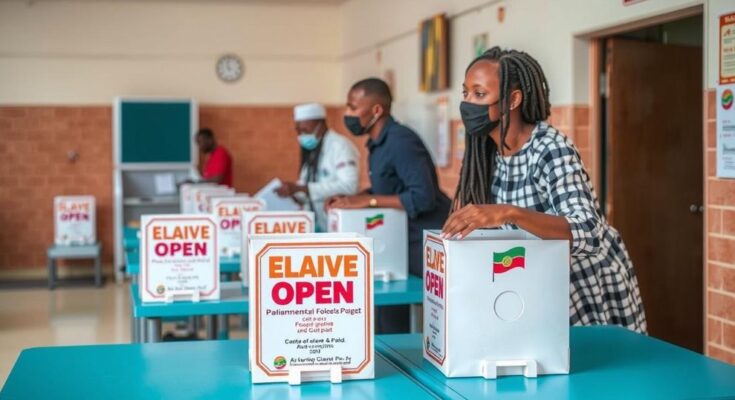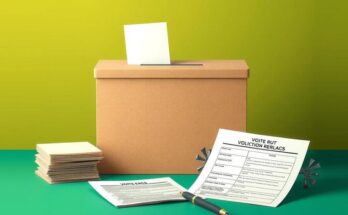Voting is underway in Chad’s first parliamentary election in 13 years amid a boycott from opposition parties, citing concerns of predetermined results. Initial turnout appears low in the capital, while President Mahamat Idriss Deby Itno urges citizens to vote. Allegations of fraud and corruption have emerged, highlighting significant political challenges faced by the nation as it seeks to transition to democracy.
Voting is currently in progress in Chad, marking the country’s first parliamentary election in 13 years. This election, touted by the government as a pivotal step towards ending military governance, allows citizens to select a new parliament, local councils, and provincial assemblies in one of the world’s economically challenged nations. However, the opposition has called for a boycott of the election, citing concerns about its legitimacy and transparency.
In the capital, N’Djamena, initial voter turnout appears to be low, with election officials attributing this to what they describe as “cold weather”. Opposition parties argue that the election results have been predetermined, discouraging the approximately eight million voters from participating. This boycott potentially benefits candidates associated with President Mahamat Idriss Deby Itno, who first assumed power through military means in 2021 and later sought to validate his leadership through a presidential election.
President Deby expressed his hopes for high voter participation, stating, “I urge all my compatriots on the electoral roll to come out and vote en masse,” as he encouraged citizens to take part in what he labeled a historic occasion. Nonetheless, critics like Succes Masra of the Transformers party contend that the electoral process is already corrupted, alleging that votes are fabricated and recorded ahead of time.
The election occurs amid significant challenges, including humanitarian issues exacerbated by climate change, which has forced nomadic communities to seek improved living conditions from elected officials. An apparent increase in vigilance is also necessary to prevent allegations of election fraud, with reports already emerging of disappearing ballots in certain regions. Despite these claims, the ruling Patriotic Salvation Movement presents the elections as a final phase in transitioning to a democratic regime following years of military-led governance.
Amid rising turmoil, including threats from the Boko Haram group, Chad seeks to stabilize and reinforce its political framework. By implementing these elections and promoting civil engagement, the government aims to restore hope and provide a pathway toward democratic governance in the Sahel region.
Chad has endured prolonged periods of military rule and civil turmoil, resulting in a lack of regular electoral processes. After the death of longtime leader Idriss Deby in 2021, Mahamat Idriss Deby Itno assumed leadership through military means, claiming to steer the nation toward democracy. As Chad embarks on its first parliamentary election in over a decade, multiple challenges remain, including an active opposition boycott, accusations of electoral fraud, and growing unrest in neighboring regions impacted by conflict and climate change. This election is seen as a crucial point for Chad’s aspirations for democratic governance, with the outcome of significant importance to the country’s stability.
The ongoing parliamentary election in Chad is a significant benchmark in the nation’s political landscape, particularly as it seeks to emerge from military rule. While the government frames this election as a transformative step towards democracy, the opposition’s boycott raises concerns about the election’s integrity and the genuine representation of the populace’s will. Amidst challenges, including humanitarian issues and external threats, the future of Chad’s political framework remains uncertain as stakeholders await the election results.
Original Source: www.aljazeera.com




